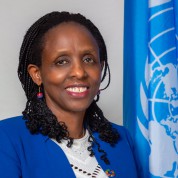WS403
Beyond Building Back Better - A Healthier and Greener World After The COVID-19
Contact Person : Peter Friberg, peter.friberg@mednet.gu.se
12
Nov
-20201104-4322.jpg)
The COVID-19 pandemic is having a major impact on people’s health, the economy and societies at large. There is huge uncertainty about the future and the implications for sustainable development. Yet, the current crisis presents a number of policy windows - areas where problems, solutions and politics will align. There are thus opportunities beyond building back better, maximizing the co-benefits of addressing climate change, pollution and biodiversity loss, food systems and improving population health. How do we build back greener and healthier?
The effects of COVID-19 have led to discussions regarding human dependence on the planet's ecosystems; a need for recognition of the dependence on ecosystem services, the impact of human development from this and acceptance of the responsibility towards future generations. The health risks of the pandemic are substantial, but so are the potential beneficial effects on health as a result of a radical climate change mitigation and adaptation. Major near-term co-benefits can arise through several pathways.
One main area is related to air pollution; 7 million premature deaths yearly are caused by combined effects from outdoor and household air pollution, according to WHO. Air pollution not only substantially contributes to the four top non-communicable diseases - stroke, lung cancer, chronic respiratory disease, and heart disease - but is also responsible for 50% of childhood pneumonia deaths. Reduced air pollution through reduced use of fossil fuels can thus provide rapid health benefits.
Another related area of great impact is our present food system, which accounts for a significant part of greenhouse gas emissions and the burden of mortality and morbidity. The COVID-19 pandemic is compromising nutrition globally, and particularly in low-income and middle-income countries. The combined effect of COVID-19 and the mitigation strategies to respond to the pandemic-including social distancing, school closures, trade restrictions, and country lockdowns-are impacting our food systems and has laid bare its fragility: Food systems may produce a health impact by facilitating the diffusion of zoonotic pathogens in human populations, and the use of antibiotics in livestock breeding and aquaculture contributes to antimicrobial resistance that severely threatens human health. Globally, food systems account for between 19-29% of global greenhouse gas emissions, and food waste remains a significant challenge, particularly in high and middle-income countries, with up to a third of food lost across supply chains. How do we change the dietary habits towards more nutritious and healthy food, and how do we provide food for 10 billion people in 2050 without using food systems that undermine the earth’s resources and further contribute to climate change, soil and water pollution, biodiversity loss, and food waste? In addition, the Lancet Commission on the global syndemic of obesity, undernutrition, and climate change ”argues for understanding ‘systemic drivers that need common actions’, proposing that tearing down silos in the academy and health policy, strengthening government action and community voices, dismantling corporate power to better designate who eats what and where, and promoting improved, more sustainable business models for a healthier future should be syndemic.”. The EAT-Lancet Commission also discusses strategies on the overlaps of food systems and climate change mitigation.
Children and adolescents have greater vulnerability than adults due to several factors, both environmental, physiological, anatomical, cognitive and psychological, related to the phase of development in which they are (Stanberry L.R). Thus, special attention needs to be directed to nutritional needs and sustainable diets of children and adolescents, as well as creating platforms for the younger population for their voices and interests to be acted upon in all areas.
In conclusion, this session will use a multisectoral approach to discuss possibilities on how to build back greener and reap the co-benefits of a fundamental and radical green and healthy recovery. Scientists agree that transforming our food systems is among the most powerful ways to change course and realize the vision of the 2030 Agenda. How do we create multi-level conversations and action to improve equal progress towards Agenda 2030, in the light of COVID-19?
The aim of this session is to discuss the linkages and syndemics across climate change, environment, food systems and health. Thus, this session will:
•Explore the evidence of, and linkages and syndemics among, various sectors to identify synergies and trade-offs with the SDG perspective according to different contexts;
•Demonstrate positive examples from different country perspectives on resilience, sustainability and transitions in the COVID-19 era; and
•Identify ways of how government, civil society and business can work together
Biosketch
Agnes Kalibata
Brama Kone
Diarmid Campbell-Lendrum
Johan Rockström
Omnia El Omrani
Presentation
Omrani_PPT.pdf
Kone_PPT.pdf
Rockström_PPT.pdf






